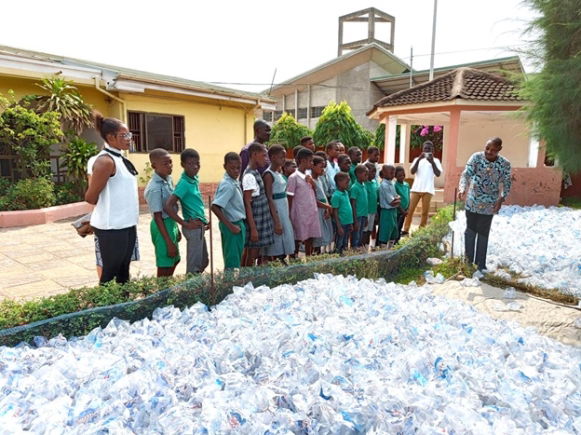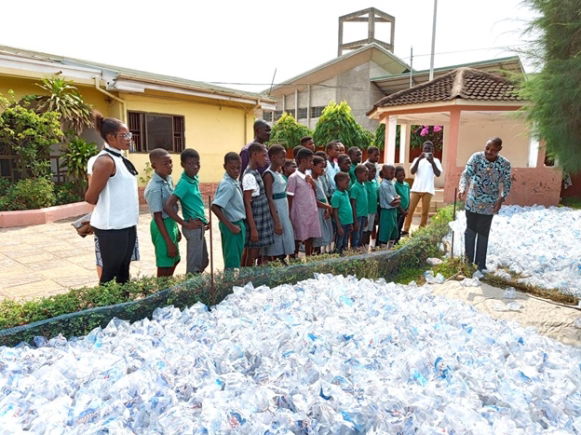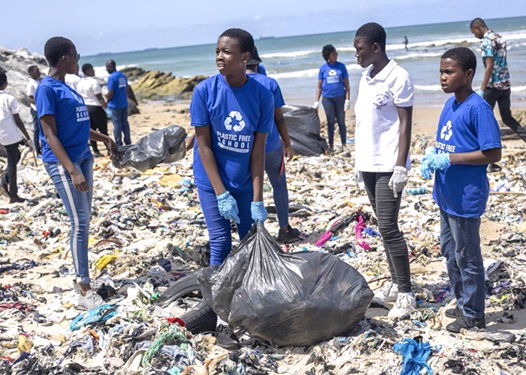
By Emmanuel Akumun, National Operator, Eco-Schools Ghana
Plastic Pollution: A global problem
Plastic pollution, especially in the form of marine litter and microplastics, is one of the most pressing environmental challenges of our time. With oceans choking on waste and landfills overflowing, global leaders responded decisively in March 2022 when 175 countries adopted a landmark resolution at the UN Environment Assembly to end plastic pollution. Ghana was among them.
Building on this momentum, the “Marine Litter and Microplastics Project: Promoting the Environmentally Sound Management of Plastic Wastes and Achieving the Prevention and Minimization of Plastic Waste Generation” was launched across several countries, including Ghana, Bangladesh, and Sri Lanka. Funded by the Norwegian Agency for Development Cooperation (Norad) and coordinated by the Secretariat of the Basel, Rotterdam, and Stockholm (BRS) Conventions in partnership with Ghana’s Ministry of Environment, Science and Technology (MEST), the initiative aims to promote the environmentally sound management of plastic waste, minimize its generation and significantly reduce marine litter and microplastics.
In Ghana, the Centre for Sustainable Transformation (CeST), an NGO committed to education for sustainable development, was selected to implement one of three pilots under the marine litter project known as Plastic-Free School using the Eco-Schools program’s Seven-step methodology, which itself is owned by the global Foundation for Environmental Education (FEE) with its headquarters in Denmark. Eco-Schools is an international education program designed to empower students to become environmentally conscious change-makers in their schools, homes, and communities by equipping them with the knowledge and skills needed to incorporate sustainability into their everyday lives and curriculum. It is the largest network of students and teachers worldwide working toward sustainability and is present in over 101 countries.

Students on a field trip to Trashy Bags Africa's upcycling facility in Abelenkpe to learn how used sachet water bags are transformed into other useful everyday items
Plastic-free school: A school-driven solution to plastic pollution
Recognizing the influence and energy of young people, the National Plastics Management Policy (NPMP) of Ghana emphasizes the importance of youth in solving the plastic crisis. In line with this, the project is grounded in the Eco-Schools Seven-Step Methodology, which integrates environmental education with practical, project-based, curricular, and student-led actions within schools.
CeST, in collaboration with MEST and the Ghana Education Service (GES), is using this methodology to empower students and teachers to become change agents.
Crucially, the program fosters community, stakeholder, and industry linkages, particularly through our partnership with Trashy Bags Africa, a social enterprise that transforms plastic waste into reusable products. By buying back sachet water bags from schools and hosting educational tours, Trashy Bags offers students real-life examples of how plastic waste can be turned into an economic opportunity.
A look back: PFS phase 1 successes and insights
Launched in 2023, Phase 1 of the pilot engaged two schools — Accra Technical Training Centre (ATTC) and St. John Bosco Basic School, Tema. From perception surveys to training workshops, awareness marches, beach clean-up exercises, photography, videography and environmental journalism training, creative exhibitions, and visits to upcycling facilities, the initiative blended learning with action in ways that deeply resonated with students, teachers, and their communities.
Through Eco-Committees, students took charge, forming action plans and electing Eco-Ambassadors to champion the cause of plastic-free schools through the drafting of DeclarActions on the minimization of plastic waste generation to be submitted to their MPs. The impact was palpable. Both schools completed all seven Eco-Schools steps and were awarded the prestigious Green Flag in recognition of their achievements. Feedback from local authorities and stakeholders confirmed that the program had ignited genuine interest, informing the scaling up of the pilot across the country, which birthed Phase 2. One major lesson? The power of hands-on, real-world learning. Students didn’t just study environmental concepts; they lived them. By connecting education to action, Phase 1 proved that youth-led sustainability projects can deliver real, measurable impact.

Students, during a beach clean-up exercise at Mighty Beach, Tema, to demonstrate to them where their plastic waste ends up when disposed of inappropriately
Building on momentum: PFS phase 2 takes off
In June 2025, the second phase of the Plastic-Free School Project began, with Kinbu Technical Senior High School and Achimota Anglican Primary & JHS selected by GES’s School Health Education Programme (SHEP) as the new pilot schools.
This phase aims to build on the success of the first with deeper engagement and a broader reach.
The project kicked off with introductory meetings, followed by dynamic inception and training workshops. First at Achimota Anglican School in late June, engaging 19 teachers and 150 students, and later at Kinbu Technical Senior High School in mid-July, where 56 teachers and 127 students participated. Facilitated by CeST and MEST, these sessions immersed teachers in the Eco-Schools methodology and the SDGs, with a focus on SDG 4.7, Education for Sustainable Development, SDG 14, Life Below Water, SDG 15, Life on Land, and SDG 12, Responsible Consumption and Production.
Teachers were challenged to see themselves not just as instructors, but as catalysts for community transformation, as well as the success of the pilot. At both schools, an Eco-Committee comprising teachers, students, and vendors at the schools’ canteens was formed to drive the project forward.
What’s happening on the ground?
Under the Marine Litter and Microplastics Project, Phase 2 of the Plastic-free School pilot features a series of rich, layered activities designed to educate, inspire, mobilize, and change students’ behavior toward plastic waste. Our partnership with Trashy Bags Africa brings this education to life, offering exhibitions, school visits, and upcycling demonstrations. Students will also participate in an awareness march, plastic-free week challenge at their schools, beach clean-up, so they can see where their improperly discarded plastic waste ends up, and citizen science data collection to identify which plastic manufacturers contribute the most to marine pollution, all while enjoying a plastic-free meal as part of their learning experience.
Similarly, just like in Phase 1, the Eco-Ambassadors in the participating schools of Phase 2 will hold Focused Group Discussions to draft DeclarACTIONS on the minimization of plastic waste generation, to be submitted to their district MPs and the Ministry of Local Government and Rural Development (MLGRD), by borrowing from the methodology of the Youth 2030 Cities Program, a global initiative that empowers young people to shape the future of their cities by actively participating in urban development and sustainability efforts by providing them a platform to co-create solutions to pressing urban challenges, especially those linked to the Sustainable Development Goals (SDGs) through leadership, innovation, and collaboration. The program, led by UN-Habitat, in partnership with Fondation Botnar as part of the broader Healthy Cities for Adolescents (HCA) initiative, aligns with the UN Youth Strategy: Youth 2030, which aims to scale up global action for and with young people.
The project will culminate in a celebratory climax event in December, featuring a curated photo and art exhibition, award presentations, FEE Green Flag Awards, and performances by students who have become ambassadors of environmental change.
Expected outcomes: The bigger picture
Through these activities, the pilot seeks to achieve several key outcomes: Increased awareness and knowledge among students and teachers about the consequences of plastic pollution, practical skills in waste segregation, reuse, and upcycling that students can apply in their homes and communities, behavioral change, including the reduction of reliance on single-use plastics at home and in schools, leadership development, as students step into roles as Eco-Ambassadors and campaign leaders, community impact, driven by school outreach events and parental involvement, policy alignment, with activities supporting Ghana’s National Plastics Management Policy and the global SDGs, and tested learning/teaching materials on the topic of plastic waste management that can be nationally replicated. Ultimately, the goal is to shape a generation of informed, motivated, and empowered youth who see themselves as part of the solution to one of the world’s most urgent environmental challenges. More than a pilot, the PFS is expected to demonstrate how, with the right education, tools, support, and inspiration, young people can take the lead in shaping a more sustainable future.